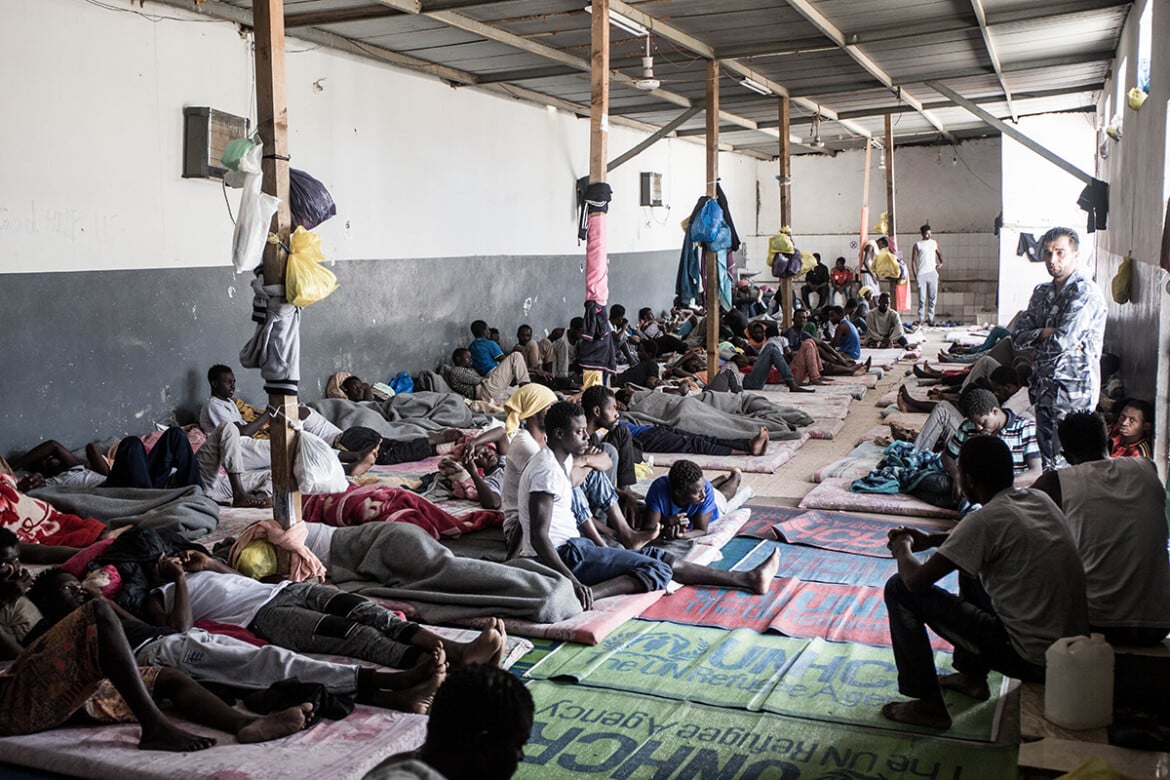Commentary
Inhumanitarian law
The torture machine in Libya continues to grind out bodies, while Meloni, who was supposed to hunt down traffickers across the globe, is attacking international and domestic judges.

‘I cannot be blackmailed,” insisted the “strong premier”, while the government’s mouthpieces, scattered across the talk shows, invoked the national interest to justify the release and comfortable flight to Tripoli of someone who in Tripoli had acquired the reputation of torturer-in-chief. Good old realpolitik, reduced to nothing more than impunity for torturers.
No one is ignorant of how serious the accusations and testimonies are, nor the extent of the involvement of the militia leader in question. After they argued that procedures must be sacrificed on the altar of national security, we see the same commentators invoking Elmasry’s civil rights and the presumption of innocence. The torture machine in Libya continues to grind out bodies, while Meloni, who was supposed to hunt down traffickers across the globe, is attacking international and domestic judges. We lock up the desperate people caught in our nets and close our eyes when any big fish comes within view.
Minister Nordio's delay sent a message that goes beyond this specific case, forcing the notion of a space for executive discretion that is not provided for in Italian law, which implements the Treaty of Rome. It is a message to the judicial bodies that deal with human rights. Then came the grotesque patchwork of justifications of Minister Piantedosi, who claimed the torture ringleader was expelled because he was “dangerous,” putting him back in command of the world of violence and abuse that made him so. As if he was posing a danger to the Italian nation by going to the stadium to see Juventus play Milan.
We are so “strong” and enjoy such “prestige” that we are bowing down sheepishly before those who are accused of every kind of cruelty against adults and children. After all, it’s no mystery what the cost of last year's drop in landings was. According to the report State Trafficking presented by Border Forensics, No Border and ASGI in Brussels, Libyan gangs are getting their supply of migrants to exploit (“black gold”) in Tunisia. The price is around a dozen euros per person.
The researchers shed light on the “steps of a logistical chain which have been integrated and refined, also as a result of the agreements between the EU and Tunisia”: Tunisian police and soldiers round up migrants in coastal towns, then send them towards the Libyan border on buses, sometimes handcuffed, sometimes after being sexually assaulted. The price of the women, potential slaves, goes up to €120. In Libya, they are taken to even more squalid detention centers in the desert, where the kidnappers abuse the migrants and contact their families demanding ransom. The report mentions the Al Assah prison, controlled by the Libyan Border Guard and receiving EU support.
It is hard to find a country where hitting the hot button of immigration doesn’t earn votes. The mechanisms of immediate rejection (avoiding ascertaining whether there is a right to humanitarian protection), as well as that of easy repatriation, take hold through measures that are usually adopted on a temporary basis (or restricted to particular circumstances) but then are never ended. The vote that united the CDU and AfD in Germany in the run-up to the elections shows this phenomenon. The first mass confinements were in Australia. Since then, they have spread to other countries one by one, from Hungary all the way to the border between Finnish and Russian Karelia.
Under Biden, we already saw migrant children in cages, torn away from their parents. Then Elon Musk – the billionaire who is attacking the Italian judiciary over migrants in Albania – posed as if he was on a human safari on the Texas border. In recent days, the newly appointed cabinet official Kristi Noem, wearing a Rolex and bulletproof vest, did a photo-op in the midst of raids against “criminal immigrants.” At the same time, the media was reporting on Donald Trump's intention to deport Palestinians from Gaza to Albania, later denied. After all, Trump has spoken of “cleaning out” Gaza, and his son-in-law Jared Kushner has plans for real estate projects in both territories. Finally, there was the announcement of the expansion of none other than Guantanamo, for aliens to be deported.
The word “alien,” used to name foreigners, is enough to distance one from modes of speaking used for humans. It should remind us of the time when organized crime in America was reduced to an “alien conspiracy”: darker-skinned Italian immigrants against civilized citizens of Anglo-Germanic stock. But there is no more sense of history, and so we prefer to let ourselves be soothed by Federico Rampini explaining that “the greatest deportation in US history” should be translated to Italian as “repatriation.” We are seeing images of Latinos being rounded up and quickly herded towards planes, with chains on their hands and feet, but we should avoid any alarming language.
A significant part of public opinion seems resigned to what is presented to them as stark reality (“realism,” “realpolitik,” etc.), and now refuses to inform itself. Many are turning away. As Luca Rastello wrote to his daughters, “almost always, what is presented as ‘how things are,’ according to an expression beloved by the realists (people who secretly love slavery), is a fraud.” The love of slavery he mentioned is less and less of a secret, and inhumanity seems to pay off. The first question that should be put to the Prime Minister, giving her an opportunity to show some strength when actually faced with the strongmen, is what exactly we are doing to shut down those places that the Pope calls “Libyan concentration camps.”
Originally published at https://ilmanifesto.it/la-regola-del-disumano on 2025-01-31
